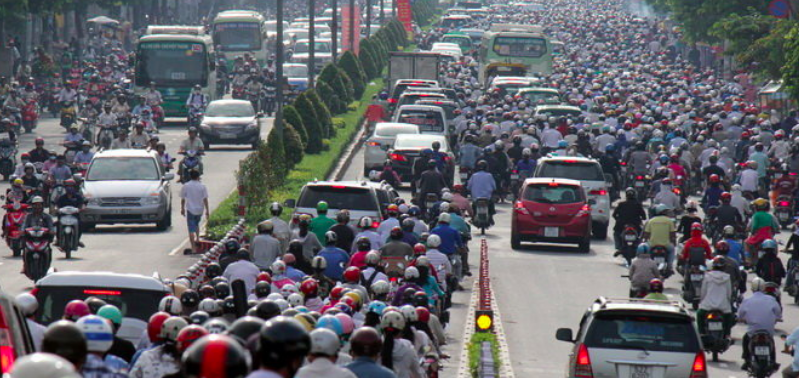A university professor has urged Vietnam to raise domestic power prices because the current low rates, though they have helped the country develop quickly, are costing it the environment.
Speaking at a public panel discussion on air quality held at the U.S. Consulate’s American Center in Ho Chi Minh City on Tuesday, Dr. Le Viet Phu, an environmental economics and policy lecturer at Fulbright University, said that the real cost of the country’s rapid economic development was being “subsidized by the environment.”
“Vietnam has developed very rapidly over the past ten years because we’ve kept a low energy price,” he told the assembled audience, “but that doesn’t work anymore.”
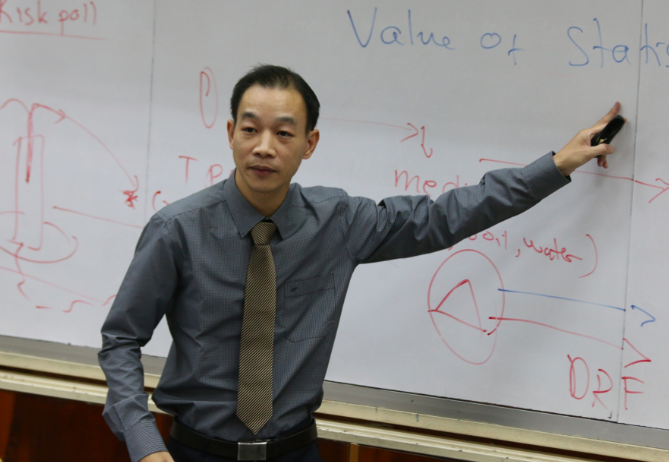 |
| Dr. Le Viet Phu. Photo: Fulbright University |
“To keep the price so low, Vietnam has used a lot of coal-fired power plants that cause air pollution,” he said.
“The cost of production, of the energy – the electricity we are using – is a lot more than the amount we are actually paying. If we want to protect the environment, we have to raise the price.”
Transparency
Calling on existing public policy around emissions to be effectively enforced, along with greater transparency around air quality monitoring data, Dr. Phu compared household energy prices in Vietnam to several developed nations.
He said that while Vietnamese consumers pay around 8 U.S. cents (VND2,000) per kilowatt-hour on average, other countries, where air pollution has been mitigated, pay a lot more.
“In the U.S., electricity costs about 10 cents per kilowatt-hour, in Germany around 30 cents, and in Australia, it’s about 30 cents as well,” Dr. Phu said.
During his presentation, Dr. Phu challenged the audience, which was predominantly Vietnamese, to personally accept a higher energy price, explaining that at present there was no economic incentive for innovation in the areas of wind turbines or solar power because the current cost of coal-powered energy was so low.
During a question and answer session, the professor also refuted the notion that higher energy prices would further marginalize people in poor, rural areas.
“To me that argument is no longer convincing,” he said, pointing out subsidies on energy that already exist for low-income earners.
“At the end of the day, you have to do it,” he emphasized, “because at the moment the environment is subsidizing the cheap price of energy.”
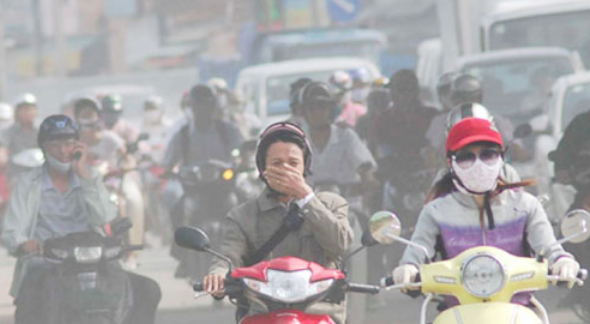 |
| Traffic in Ho Chi Minh City. Photo: Tuoi Tre |
Noting the government’s stated commitment to coal-fired power through until 2030, the Fulbright University academic, who received his PhD from the University of California in Berkeley in 2013, said he would support further taxes on gasoline, currently set at VND4,000 per liter locally – a number also much lower than in most developed countries.
Protection
Dr. George Conway, an expert in air quality and health who now works as the director of the Deschutes County Health Department in the U.S. state of Oregon, was also part of the panel.
Flown over by the U.S. Consulate General for a series of related events in Ho Chi Minh City and Hanoi, he previously worked in Beijing, China at the beginning of what has been dubbed ‘airpocalypse,’ and became a foreign activist for change in the country at that time.
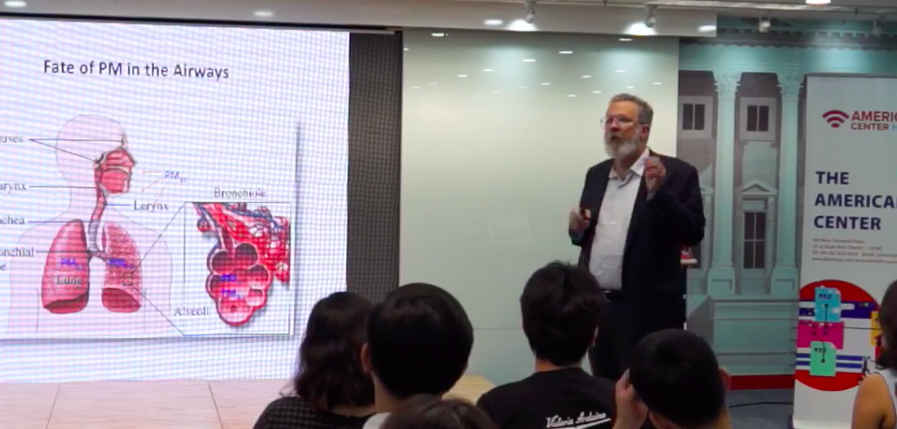 |
| Dr. George Conway presents the dangers of air pollution at The American Center on Tuesday, May 8, 2018. Photo: Facebook |
Aside from presenting the dangers of poor quality air and how one can protect themselves, Professor Conway called for the establishment of emissions testing on vehicles, the complete transition from two-stroke to four-stroke engines – which are significantly cleaner – and self-monitoring of daily air quality at home.
He also encouraged the use of bicycles and public transportation as often as possible.
Welfare
Earlier, U.S. Consul General Mary Tarnowka had opened the event, part of the American embassy’s global Air Quality Awareness Week.
She highlighted the United States’ own experience of successfully overcoming “extremely unhealthy” air, via what she described as “widespread citizen interest and concern,” which led to the implementation of the Clean Air Act in 1970.
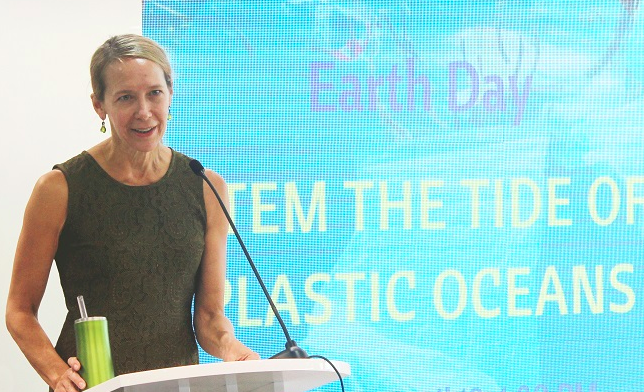 |
| U.S. Consul General Mary Tarnowka speaks at The American Center on April 22, 2018. Photo: Facebook |
Tarnowka called this one of the most important pieces of legislation in America of the 20th century, resulting in national air pollution emissions dropping by an average of 69 percent between 1970 and 2014.
The diplomat attributed this to three things: a good law, transparent data and strong enforcement.
Speaking not only as a representative of the United States but as a parent, Tarnowka urged the audience to think about the kind of future they wanted for their children, before pointing out the long-term economic and social cost of dangerously unhealthy air.
In 2013, the World Bank estimated that as many of 66,300 premature deaths had been caused in Vietnam by poor quality air, with an associated welfare cost of $24 billion.
Since this time, air quality in Vietnam’s two major urban centers, Hanoi and Ho Chi Minh City, has significantly declined.
Like us on Facebook or follow us on Twitter to get the latest news about Vietnam!



